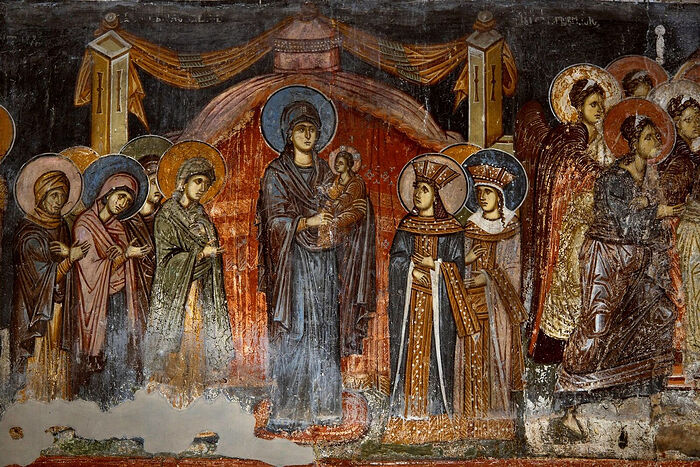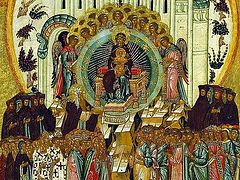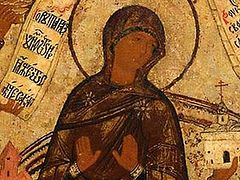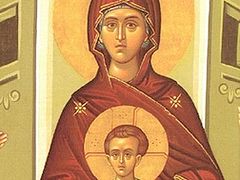On the eve of the fifth week of Great Lent, the holy Church has established that we should celebrate the Laudations of the Most Holy Theotokos, a special service in which the well-known Akathist to the Mother of God is solemnly sung, and therefore this day is called the Saturday of the Akathist.
According to historians, in antiquity, this day was a kind of forefeast for the feast of the Annunciation, which was celebrated in Great Lent at some point after this Saturday and before the Entrance of the Lord into Jerusalem—until the Council of Trullo determined a set date for the Annunciation in the late seventh century—March 25/April 7. This is evidenced by the use of the hymns of the feast of the Annunciation, as well as the entire content of the Akathist, glorifying the Incarnation of God.
Later, the victory of Emperor Heraclius in the Persian War began to be commemorated on the same day, in particular, the deliverance of Constantinople from the invasion of the Persians and Avars in 626, as well as the subsequent sieges of the city by the Arabs. It was probably then that the Champion Leader kontakion was added to the Akathist, which doesn’t follow the Akathist’s alphabetic acrostic—when each new kontakion or ikos begins with the next letter of the alphabet. And the entire service began to directly praise the Theotokos, who miraculously delivered Constantinople from its enemies, to a greater degree.
Thus, in this remarkable service, the glorification of the Annunciation, the dawn of our salvation, which began with the Archangel’s greeting to the Most Pure Virgin: “Rejoice,” and the praise of our Champion Leader, the Most Holy Lady, who delivers us from both visible and invisible enemies and thanks to whom salvation became possible, are wondrously intertwined.
After all, if not for her humility, her purity, her devoted and self-sacrificing service to God, the Lord would not have been able to take on human nature, darkened by sin, or to have even drawn near to it. In her womb was woven the flesh of the New Adam—Christ, Who was not liable to the tyranny of sin, and the Most Holy Virgin became the first person to receive renewal and sanctification from the Body and Blood of the Savior, from His Divine nature.
This New Eve became the prototype of the holy Church, which births us for the spiritual life, and she became our true Mother, because she gave us Life—Christ, in Whom we find salvation and life eternal. She is our ideal and our spiritual guide in ascending to Heaven, because she was the first to attain perfection, a state of theosis; and she teaches her children the virtues of love, humility, obedience, and purity by her own example.
The Most Holy Virgin is our leader in spiritual warfare; she leads us into battle, promising victory. Not only because she repeatedly saved Byzantium, and later Russian and other Orthodox states from an external enemy, but also because she protects us today from a war that is more terrible than all these others. But above all, it is because the path of spiritual ascent involves struggle—a struggle with the old man, with his passions and shortcomings, with the cowardice and despondency that come from sin.
And here the Most Holy Theotokos, the majestic Queen of Heaven and Earth, condescends to our infirmity. She will always support and strengthen her children in a motherly fashion. In her is our victory, in her is our praise and glory, because by praising her virtue and perfection—our ideal, to which we aspire—we ourselves participate in them and partake of her joy. For it’s given not so much to her as to the entire Church, and therefore the humble Virgin says by the Holy Spirit that all generations will bless her for her spiritual benefit.
Our victory is not external, but internal and spiritual. It opens to us the entrance to the Heavenly Kingdom, hidden within our heart. This is the victory of good over evil, faith over rational wisdom, humility over pride. In the Song of the Mother of God, the Most Holy Lady thanks the Creator for having regarded the low estate of His handmaiden: for, behold, from henceforth all generations shall call me blessed… He hath put down the mighty from their seats, and exalted them of low degree. He hath filled the hungry with good things; and the rich He hath sent empty away (Lk. 1:48, 52-53).
Whoever believes the Good News of Christ and follows the path of the Gospel commandments, whoever repents and seeks justification from God, overcomes the world and himself. Humbling yourself, you receive glory; when you give, you gain a hundredfold; dissipating your soul in love in this world, you gain it for eternity. We are taught all of this and carefully led to all of this by our intercessor, our Most Holy Lady and Mother, whom we love, thank, and ceaselessly praise: “Rejoice, Tabernacle of God the Word. Rejoice, Holy one, holier than the Holies… Rejoice, thou through whom trophies are raised up. Rejoice, thou whom enemies are cast down… Rejoice, O Unwedded Bride.”
Amen.




